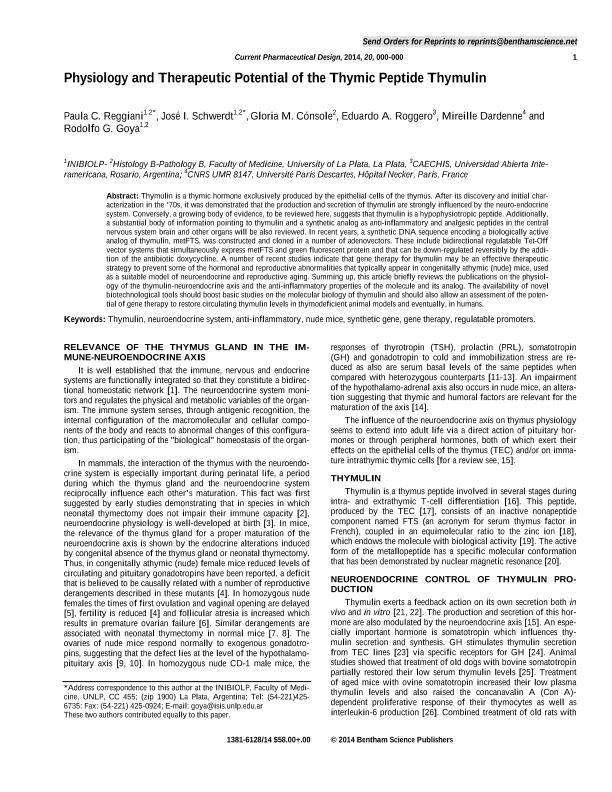Artículo
Physiology and Therapeutic Potential of the Thymic Peptide Thymulin
Reggiani, Paula Cecilia ; Schwerdt, José Ignacio
; Schwerdt, José Ignacio ; Console de Avegliano, Gloria Miriam; Roggero, Eduardo Angel; Dardenne, Mireille; Goya, Rodolfo Gustavo
; Console de Avegliano, Gloria Miriam; Roggero, Eduardo Angel; Dardenne, Mireille; Goya, Rodolfo Gustavo
 ; Schwerdt, José Ignacio
; Schwerdt, José Ignacio ; Console de Avegliano, Gloria Miriam; Roggero, Eduardo Angel; Dardenne, Mireille; Goya, Rodolfo Gustavo
; Console de Avegliano, Gloria Miriam; Roggero, Eduardo Angel; Dardenne, Mireille; Goya, Rodolfo Gustavo
Fecha de publicación:
07/2014
Editorial:
Bentham Science Publishers
Revista:
Current Pharmaceutical Design
ISSN:
1381-6128
Idioma:
Inglés
Tipo de recurso:
Artículo publicado
Clasificación temática:
Resumen
Thymulin is a thymic hormone exclusively produced by the epithelial cells of the thymus. After its discovery and initial characterization in the ‘70s, it was demonstrated that the production and secretion of thymulin are strongly influenced by the neuro-endocrine system. Conversely, a growing body of evidence, to be reviewed here, suggests that thymulin is a hypophysiotropic peptide. Additionally, a substantial body of information pointing to thymulin and a synthetic analog as anti-inflammatory and analgesic peptides in the central nervous system brain and other organs will be also reviewed. In recent years, a synthetic DNA sequence encoding a biologically active analog of thymulin, metFTS, was constructed and cloned in a number of adenovectors. These include bidirectional regulatable Tet-Off vector systems that simultaneously express metFTS and green fluorescent protein and that can be down-regulated reversibly by the addition of the antibiotic doxycycline. A number of recent studies indicate that gene therapy for thymulin may be an effective therapeutic strategy to prevent some of the hormonal and reproductive abnormalities that typically appear in congenitally athymic (nude) mice, used as a suitable model of neuroendocrine and reproductive aging. Summing up, this article briefly reviews the publications on the physiology of the thymulin-neuroendocrine axis and the anti-inflammatory properties of the molecule and its analog. The availability of novel biotechnological tools should boost basic studies on the molecular biology of thymulin and should also allow an assessment of the potential of gene therapy to restore circulating thymulin levels in thymodeficient animal models and eventually, in humans
Archivos asociados
Licencia
Identificadores
Colecciones
Articulos(INIBIOLP)
Articulos de INST.DE INVEST.BIOQUIMICAS DE LA PLATA
Articulos de INST.DE INVEST.BIOQUIMICAS DE LA PLATA
Citación
Schwerdt, José Ignacio; Roggero, Eduardo Angel; Reggiani, Paula Cecilia; Console de Avegliano, Gloria Miriam; Goya, Rodolfo Gustavo; Dardenne, Mireille; et al.; Physiology and Therapeutic Potential of the Thymic Peptide Thymulin; Bentham Science Publishers; Current Pharmaceutical Design; 20; 29; 7-2014; 4690-4696
Compartir
Altmétricas



